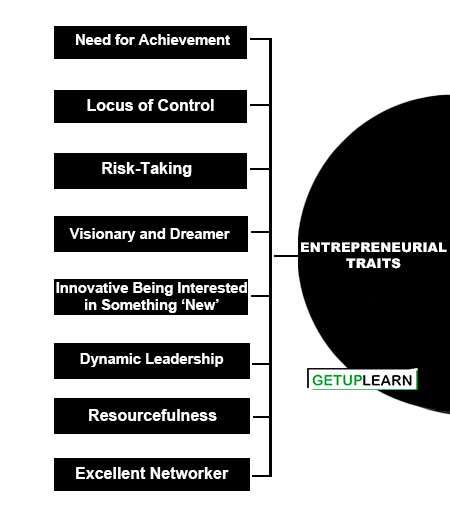Table of Contents
Meaning of Entrepreneurial
The entrepreneur is commonly seen as a business leader and innovator of new ideas and business processes. Management skills and strong team-building abilities are often perceived as essential leadership attributes for successful entrepreneurs. Robert B. Reich considers leadership, management ability, and team building as essential qualities of an entrepreneur.
An entrepreneur is a person who starts an enterprise. He searches for change and responds to it. A number of definitions have been given of an entrepreneur. Economists view him as a fourth factor of production along with land, labor, and capital.
Sociologists feel that certain communities and cultures promote entrepreneurship for example in India we say that Gujaratis and Sindhis are very enterprising. Still others feel that entrepreneurs are innovators who come up with new ideas for products, markets, or techniques.
To put it very simply an entrepreneur is someone who perceives opportunity, organizes resources needed for exploiting that opportunity, and exploits it. Computers, mobile phones, washing machines, ATMs, Credit Cards, Courier services, and ready-to-eat Foods are all examples of entrepreneurial ideas that got converted into products or services.
Entrepreneurial Traits
Research in the area of entrepreneurship has identified a large number of personality traits that differentiate an entrepreneur from others and contribute to their success. Three key traits discussed more frequently in a number of studies are the need for achievement, locus of control, and risk-taking ability:
- Need for Achievement
- Locus of Control
- Risk-Taking
- Visionary and Dreamer
- Innovative Being Interested in Something ‘New’
- Dynamic Leadership
- Resourcefulness
- Excellent Networker

Need for Achievement
Entrepreneurs are individuals who have an intense desire for and focus on significant accomplishment and mastering skills and do not compromise on maintaining high standards. Need for achievement basically, means wholeheartedly working for the fulfillment of a vision.
Subsequently, McClelland contributed to the popularization of this concept through his work in the area of economic development and psychology. According to him, a set of people having an intense need to achieve is different from the rest of them. They prefer to work hard on a problem rather than leave it to chance or fate.
They take a middle ground by taking a moderate degree of risk because they have faith in themselves and their abilities to influence the outcome. They take tasks challenging with moderate risk but that are achievable goals or solving a difficult problem gives greater satisfaction than a reward by way of money.
Locus of Control
The second vital trait associated is locus of control. The term ‘locus’ was first introduced by psychologist Julian Rotter in the 1950s, It refers to a person’s fundamental belief system about events and outcomes that happen in their life. It can also be defined as an individual’s perceptions about the rewards and punishments in their life (Pervin, 1980).
According to the locus of control theory, there are two types of people, namely, internals and externals. Individuals with an internal locus of control believe and have faith that they are able to control life events and the future depends upon their own efforts.
It is something like an entrepreneur who starts a venture and has a firm belief that it is they and their efforts that would lead to happenings and outcomes in their life. They are proactive in assessing environmental changes and prepare themselves in advance to appropriately respond to such challenges.
Risk-Taking
Risk-taking is an inbuilt imperative for an entrepreneur because one cannot expect to gain something in the future without taking the risk of facing uncertainties and imponderables. According to Peter Drucker, entrepreneurship is about taking risks. Entrepreneurial Behaviour is reflected in a person willing to take a risk of getting wedded to an idea at the cost of their career and financial security.
Knight classified three types of uncertainty risk that can be measured statistically, ambiguity that is difficult to measure statistically, and uncertainty that cannot be predicted statistically.
Entrepreneurs come across all three types of risks, and the greatest challenge to them lies in having complete uncertainty in bringing out something really novel to the world whose market does not exist. However, even if a market for the product exists, there is never a guarantee that it exists for the new entrant under consideration.
Visionary and Dreamer
There have been many definitions of vision perhaps the one that most suits an entrepreneur is ‘the ability to see the unseen’. Visionary personalities have the ability to see through things in advance and dream big. Some think that vision is an intrinsic ability and a gift that you either have or do not have. It is certainly something innate.
However, the fact remains that it comes with targeted knowledge and understanding. Entrepreneurship is not just about becoming a ‘guru’ or becoming a pathsetter, it is about finding the right path when others cannot and it is about being able to see incremental needs as well as solutions to fulfill those needs by seeing through the opportunities that others do not see.
It is that instinct backed up by a concrete process that enables an entrepreneur to avail themselves of an opportunity in time. A vision from the past makes a great fortune for an inventor and acts as the cat’s eyes that can be seen in the middle of the road while driving in the dark. As against this, an incremental improvement is like making something more effective and deriving a benefit from it.
Innovative Being Interested in Something ‘New’
Entrepreneurs are highly innovative and new and unique things interest them the most. They are always looking for new solutions to existing pain points or solutions to emerging pain points. They have a great curiosity backed by deep and everlasting interest in new ways of doing things, new ways of making things better, faster, more efficient, more effective, stronger, lighter, more beautiful, tastier, more elegant, simpler, and so on. It is this interest and ingenuity in them that probably makes them click.
Thus, it is not only new ideas that attract the entrepreneur but also old problems that can be handled in a much simpler, better, and more efficient manner by identifying new workable solutions. The entrepreneur comes out with new problems and solutions to such problems.
Dynamic Leadership
An entrepreneur is often thrown into the role of leader because of their ability to visualize, formalize, and understand the innovation and its value. They have to be necessarily a good leader first as well as a good manager. Not all entrepreneurs are suited to lead, and some may even feel uncomfortable to lead an organization.
However, the chances of success as an entrepreneur depend much upon a good leader leading the team. Entrepreneurial leadership takes initiative, risk, and responsibility and channelizes creativity in an organization, so as to achieve organizational goals with a deeper and genuine concern for all stakeholders.
It is this trait that keeps entrepreneurs moving forward and going in spite of all odds and setbacks, which is the hallmark of all successful business leaders. Good leaders bring with them vision, optimism, courage, self-esteem, tolerance to ambiguity, achievement motivation, meticulous planning, focus on execution, and goal orientation.
Resourcefulness
Entrepreneurs in general are highly resourceful in getting hold of what they need with their creative and imaginative potential. They are highly ingenious and inventive to make the best use of what they have at their disposal to respond to challenges effectively.
This trait enables them to deal effectively with the problems and difficulties that they are confronted with. In their dictionary, the word ‘no’ does not exist. They only know how to get things done against all odds. Entrepreneurs have to necessarily think out of the box to improve their chances of getting the resources such as capital, the right people, and the raw materials they need to succeed.
As such, normally getting what they need the most becomes very difficult, but it is their ingenuity that enables them to succeed in getting what they need. True entrepreneurs are resourceful and can create something out of nothing.
Excellent Networker
Entrepreneurs maintain and build contacts regularly with people who matter directly or indirectly to their business without expecting anything in return. Successful entrepreneurs have a charismatic personality. The secret behind their success in networking lies in having characteristics such as being open, receptive, flexible, and winsome.
They are highly attentive and intense listeners. They remember the names of people with whom they interact. It is these skills that enable entrepreneurs to build, develop, and strengthen networks of relationships both in and outside the organization in a very smooth and harmonious manner. They have the knack of easily mingling with different people. They are good at building and nurturing relationships based on mutual dependency and give and take that matter in the sustainable growth of the business.
FAQs Section About Entrepreneurial Traits
What are the entrepreneurial traits?
Need for Achievement 2. Locus of Control 3. Risk-Taking 4. Visionary and Dreamer 5. Innovative Being Interested in Something ‘New’ 6. Dynamic Leadership 7. Resourcefulness 8. Excellent networkers are the entrepreneurial traits.

